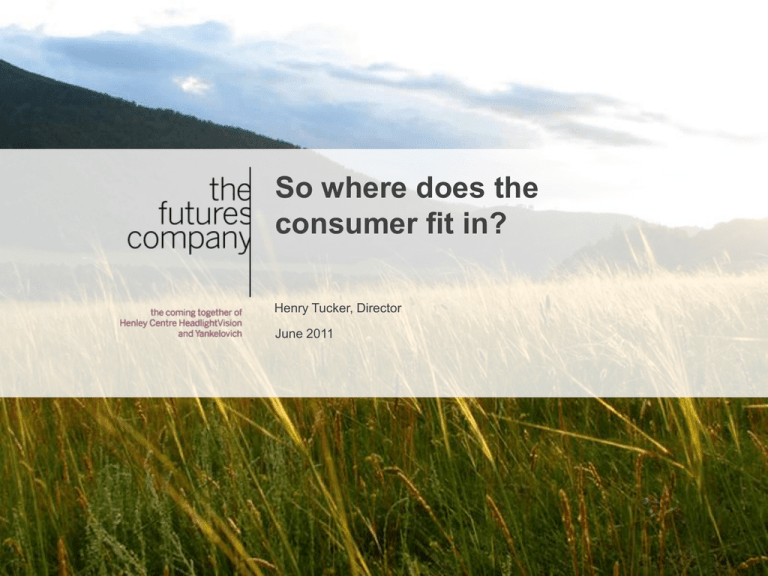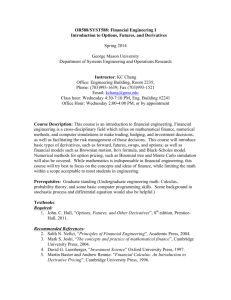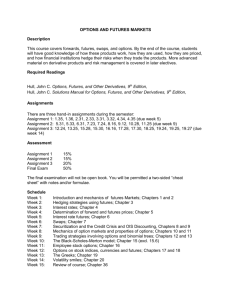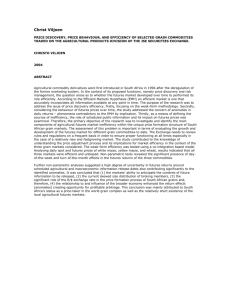So where does the consumer fit in? Henry Tucker, Director June 2011
advertisement

So where does the consumer fit in? Henry Tucker, Director June 2011 Who we are © The Futures Company 2011 1 The leading global foresight and futures consultancy Consultants, researchers and futures experts who unlock strategies for future success Formed from the merger of The Henley Centre, HeadlightVision and Yankelovich, with 100 years of combined experience Teams in UK, US, Mexico, Brazil, Argentina, India A Kantar company within WPP © The Futures Company 2011 2 We have worked with a wide array of organisations to help them define their strategy © The Futures Company 2011 3 Where are we now? © The Futures Company 2011 4 A moment of transition The assumptions of the long global boom Globalization is inevitable Technology will render everything inexpensive Capital is cheap Oil is plentiful Open markets are the best way forward But following the 2008 financial crisis, these assumptions are being challenged A new world is starting to open up – but the old world is still in place We are in a moment of transition © The Futures Company 2011 5 A world of divided prospects and different pathways Stressed & struggling to cope Cautious & uncertain about the future Hopeful & optimistic © The Futures Company 2011 6 Source: The Futures Company Global MONITOR 2010 (Standardized data) Tension at the boundaries The 50+ age group has more discretionary income than any other demographic In the 17 countries forming the Eurozone, joblessness among the young stands at 20.4% in January 2011, up from 14.6% in February 2008 before the start of the financial crisis. Source Financial Times Feb 2011 “Europe grapples with youth unemployment”, © The Futures Company 2011 7 Consumers continue to tell us that the environment is important, despite a dip since the recession Climate change is the single biggest single problem facing the world today 100% % Agree strongly or slightly 61% 51% 51% 2009 2010 50% 0% 2008 © The Futures Company 2011 8 Source: The Futures Company, Global Monitor 2010 However, behaviour change has been less extensive than we might have expected Compared to the £68.8 billion spent on food by the UK consumer in 2008, only £4.3 billion is spent on ethical food and drink* Expenditure on Green Home products represents less than 1% of total household expenditure Only 34% of household waste was recycled or composted in 2007-8, estimates suggest that this is half of what could be recovered *Includes: Organic, Fairtrade, Rainforest Alliance, Farmer’s markets, Free range eggs and poultry, Freedom Foods, Sustainable Fish and Dolphin-Friendly tuna. © The Futures Company 2011 9 Euromonitor, The Cooperative Bank, DEFRA Why is there such a large gap between concern and proenvironmental action? © The Futures Company 2011 10 Understanding engagement © The Futures Company 2011 11 Engagement with the environment for the majority is relatively shallow – it is not a core life priority or concern driving consumption decisions My priorities © The Futures Company 2011 12 The environment Where environmental action is present it has often been linked with one or more core life priorities My priorities e.g. Growing vegetables with the kids e.g. Turning down the thermostat © The Futures Company 2011 13 We know that consumers are most concerned about – and likely to act upon – the issues that directly affect them and their family My World Our World The World © The Futures Company 2011 14 Some green behaviours have become mainstream because they are simple, tangible and easy to visualise LESS LANDFILL © The Futures Company 2011 15 FEWER WATER SHORTAGES The idea of avoiding waste is also underpinning many current green actions “Everything in our house is unplugged except for the fridge and the Sky Box... It only saves a bit but it’s a waste otherwise” Adopter “I always prefer to reuse things rather than throw them away. It’s got nothing to do with the environment though” Sceptic © The Futures Company 2011 16 Source: The Futures Company Qualitative Research Overall, the perceived personal benefits of a green action must outweigh the perceived costs for consumers to take action Potential costs to me: • More expensive • More time and effort • Worse quality products • Sacrifice what I want to do © The Futures Company 2011 17 vs. Potential benefits to me: • Save money • Better for my health • Better quality products • Feel good / alleviate guilt • Social kudos It is important to recognise that perceptions of the personal costs and benefits of green products and behaviours are not consistent Less engaged More engaged “Green cleaning products don‟t work!” “Less chemicals so better for me and my family” “Just a way of the supermarkets to make more money from me” “Organic veg is much tastier, and better for you” “Taking the tram is expensive and an inconvenience – I‟d rather drive” “Saves me time and avoids the stress of driving” © The Futures Company 2011 18 Looking forward © The Futures Company 2011 19 There is a core of consumers who are actively engaged and motivated by „doing their bit‟ and who are seeking green solutions © The Futures Company 2011 20 The Mainstream are looking for others to take the lead, or for clear personal benefits © The Futures Company 2011 21 Picture credits: Kenco Sceptics are more proactively „wound up‟ by the environmental agenda “I play along with the game and do my recycling but I think it’s a load of nonsense.” Sceptic © The Futures Company 2011 22 How to drive „My World‟ relevance? Environment My World Health Our World The World © The Futures Company 2011 23 How to drive „My World‟ relevance? © The Futures Company 2011 24 The Organic sector is going to have fight harder for share of mind with consumers Think about consumers‟ life priorities – how can you offer solutions in line with these? Keep it simple – whether on pack, on-line or in-store make it easy to understand the benefit you offer Thank you Henry Tucker, Director +44 7768 034 984 Henry.tucker@thefuturescompany.com www.thefuturescompany.com Follow us on Twitter




